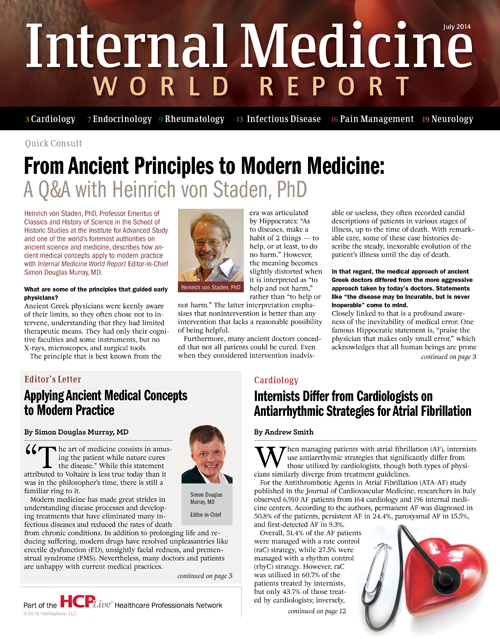Publication
Article
Internal Medicine World Report
From Ancient Principles to Modern Medicine: A Q&A with Heinrich von Staden, PhD
Heinrich von Staden, PhD, Professor Emeritus of Classics and History of Science in the School of Historic Studies at the Institute for Advanced Study and one of the world's foremost authorities on ancient science and medicine, describes how ancient medical concepts apply to modern practice.
Heinrich von Staden, PhD, Professor Emeritus of Classics and History of Science in the School of Historic Studies at the Institute for Advanced Study and one of the world’s foremost authorities on ancient science and medicine, describes how ancient medical concepts apply to modern practice with Internal Medicine World Report Editor-in-Chief Simon Douglas Murray, MD.
What are some of the principles that guided early physicians?

Ancient Greek physicians were keenly aware of their limits, so they often chose not to intervene, understanding that they had limited therapeutic means. They had only their cognitive faculties and some instruments, but no X-rays, microscopes, and surgical tools.
The principle that is best known from the era was articulated by Hippocrates: “As to diseases, make a habit of 2 things — to help, or at least, to do no harm.” However, the meaning becomes slightly distorted when it is interpreted as “to help and not harm,” rather than “to help or not harm.” The latter interpretation emphasizes that nonintervention is better than any intervention that lacks a reasonable possibility of being helpful.
Furthermore, many ancient doctors conceded that not all patients could be cured. Even when they considered intervention inadvisable or useless, they often recorded candid descriptions of patients in various stages of illness, up to the time of death. With remarkable care, some of these case histories describe the steady, inexorable evolution of the patient’s illness until the day of death.
In that regard, the medical approach of ancient Greek doctors differed from the more aggressive approach taken by today’s doctors. Statements like “the disease may be incurable, but is never inoperable” come to mind.
Closely linked to that is a profound awareness of the inevitability of medical error. One famous Hippocratic statement is, “praise the physician that makes only small error,” which acknowledges that all human beings are prone to make mistakes.
Many ancient Greek physicians were very aware of the possibility of iatrogenic harm, and they wrote about it freely, sometimes even giving detailed autobiographical accounts of their own errors. By overtly detailing such errors, some hoped that future practitioners might avoid the same mistakes.
Did early physicians use medications?
They used many different medicines largely derived from plants, though some were derived from animals and others from minerals. Their recognition that these drugs could be quite dangerous led to the first attempts to classify and quantify pharmacologic ingredients, particularly in compounded drugs containing multiple ingredients. Nonetheless, these methods were quite crude by today’s standards.
The ancient physicians realized the medicines had the potential to help, but could also be quite dangerous, or even fatal. The compositions and effects of various drugs were recorded in great detail, although the ingredients and exact amounts could only be estimated. Medicines came mainly from Greece and Italy, though some were imported from Egypt, Ethiopia, and parts of Asia.
The ancient physicians also recognized enormous variability among patients, so treatment was individualized to some extent. Although they didn’t know anything about genetics, they recognized that bodies were all made up of the same basic components that were invariable, yet reacted differently under different circumstances.
There was a very strong emphasis on understanding each patient’s environmental, social, dietary, and lifestyle contexts, because they all played a role in response to pathogens and treatment. As a result, a productive tension between generalization and individualization is often visible in ancient medical texts.
In the 12th century, Maimonides, the famous Jewish scholar, said, “The physician should not treat the disease, but the patient who is suffering from it.” While modern doctors recognize this, there is a tendency to standardize treatments for illnesses, and having standard treatment protocols protects the public from dangerous physicians who treat patients based on faulty logic, inadequate experience, and intuition without knowledge.
The ancient physicians did operate on a set of general rules — diagnostically and therapeutically — while appreciating the variability among individual patients. They knew it was important to understand not only the body’s contents, but also the context in which each body exists.
Did the beliefs of ancient Greek physicians conflict with religious people of their era who believed diseases were God’s way of punishing man, so only He could cure illness?
The religious and scientific healing traditions coexisted peacefully and were not necessarily mutually exclusive. This is still the case today, whereby a patient goes to the doctor on Thursday for medical care and to church on Sunday for healing hands and prayer. However, some ancient Greek physicians were highly critical of the notion of using divine intervention to explain disease. Rather, they believed there were scientific laws that govern the behavior of bodies, so solutions to illness had to come from natural sources, not divine causation.
Some ancient writers thought the basic natural constituents of human bodies were humors, corpus skills, and atoms, and that these components were invariable. Many shared specific insights, such as blood moving from the left ventricle of the heart into the arterial network, and understood the specific functions of nerves and muscles. Based on their beliefs of basic bodily components and specific knowledge on function, ancient Greek physicians tried to establish general, non-divine therapeutic principles, even as religious healing continued.
How was medicine taught to aspiring doctors in ancient times?
The training was basically an apprenticeship. Initially, medicine was regarded as a family business, passed from father to son within a clan. Sometime later, nonfamily members were allowed to receive training for a fee. Nonetheless, those students were afforded the same privileges as one’s sons, so they were integrated into the professional collectivity. Physicians were a very close-knit group.
The focus of training was on developing the skills of observation and understanding the effects of all external and internal factors on the body, including therapeutic interventions. Some apprentices were also trained in surgery, especially in orthopedic procedures that involved the treatment of head wounds, fractures, and dislocations. They were also trained to keep wounds clean, and they used raw honey containing propolis to treat wounds, as it prevented drying out, formed a barrier, and had bactericidal properties.
What was the social status of physicians of the period?
There was great variability in the societal role physicians played. In the Roman Empire, physicians were mostly Greeks who were slaves, captured as prisoners of war. Some physicians were itinerant, while others were hired by cities or the wealthy.
Perceptions of physicians also varied greatly. In literary genres like satire and comedy, doctors were a favorite target, caricatured for their wealth, incompetence, and pretentious pseudo-knowledge. On the other hand, some doctors received the highest public and private accolades and honors.
What was Islam's greatest contribution to modern medicine?
A large contribution was made in 9th-century Baghdad, when an enormous body of ancient Greek medical texts was transcribed, preserved, and translated into Arabic. In many cases, the original Greek texts have not survived, so the Arabic translations provide versions of many significant medical treatises.
What did the Romans contribute to modern medicine?
One early Greek philosopher residing in Rome was Celsus, who wrote a medical encyclopedia that starts with a lengthy prologue describing the value of theoretical debates about the foundations of medical knowledge. He devoted several volumes to preventive and therapeutic regimens, pharmacology, and surgery. In later volumes, Celsus described cataract surgery, orthopedic surgery, and even a technique to reverse circumcision.
Numerous volumes of medical treatises were written in Latin and serve as the basis for our modern knowledge. In fact, much of our current medical terminology is derived from this Latin tradition, and also from the Greek tradition.
What major lessons can today’s doctors learn from antiquity?
There are many. First, understand that there are limits to what medicine can do. Being honest about that is the best policy, if one doesn’t want to mislead patients.
Second, understand that making mistakes is inevitable. Instead of hiding errors, admit to them so as to not make future mistakes. Besides, he who forgets the past is destined to relive it.
Third, recognize the common principles and even natural laws that govern human physiology, but treat each patient as a unique individual. There may be times when you disagree with the established principles.
One thing I haven’t mentioned from the era of Hippocrates is to limit the number of patients; otherwise, you won’t get to know any of them sufficiently enough to provide optimal care. You won’t know the whole body unless you understand the larger context.
Finally, never be too sure of your certainty. Instead, realize that ideas change over time. Some ancient doctors were often too sure of their beliefs and became dogmatic. What we do now in medicine is provisionally the best we can do, but that doesn’t necessarily mean it’s the best it can be and the only correct way to do things.




